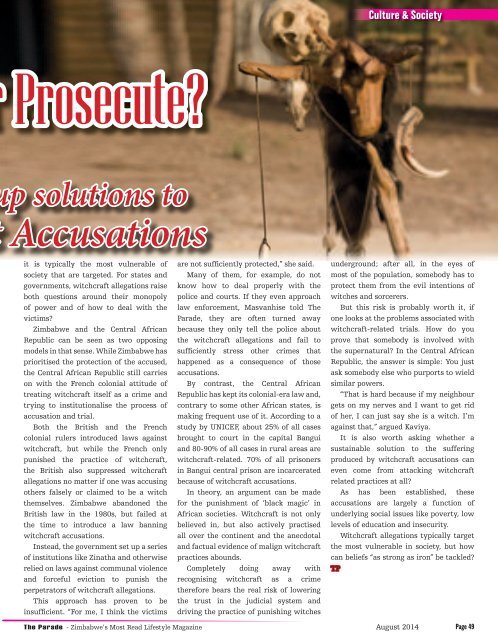o_1915f04bi181p2m9qs12em17oea.pdf
You also want an ePaper? Increase the reach of your titles
YUMPU automatically turns print PDFs into web optimized ePapers that Google loves.
Culture & Society<br />
Prosecute?<br />
p solutions to<br />
Accusations<br />
it is typically the most vulnerable of<br />
society that are targeted. For states and<br />
governments, witchcraft allegations raise<br />
both questions around their monopoly<br />
of power and of how to deal with the<br />
victims?<br />
Zimbabwe and the Central African<br />
Republic can be seen as two opposing<br />
models in that sense. While Zimbabwe has<br />
prioritised the protection of the accused,<br />
the Central African Republic still carries<br />
on with the French colonial attitude of<br />
treating witchcraft itself as a crime and<br />
trying to institutionalise the process of<br />
accusation and trial.<br />
Both the British and the French<br />
colonial rulers introduced laws against<br />
witchcraft, but while the French only<br />
punished the practice of witchcraft,<br />
the British also suppressed witchcraft<br />
allegations no matter if one was accusing<br />
others falsely or claimed to be a witch<br />
themselves. Zimbabwe abandoned the<br />
British law in the 1980s, but failed at<br />
the time to introduce a law banning<br />
witchcraft accusations.<br />
Instead, the government set up a series<br />
of institutions like Zinatha and otherwise<br />
relied on laws against communal violence<br />
and forceful eviction to punish the<br />
perpetrators of witchcraft allegations.<br />
This approach has proven to be<br />
<br />
<br />
Many of them, for example, do not<br />
know how to deal properly with the<br />
police and courts. If they even approach<br />
law enforcement, Masvanhise told The<br />
Parade, they are often turned away<br />
because they only tell the police about<br />
the witchcraft allegations and fail to<br />
<br />
happened as a consequence of those<br />
accusations.<br />
By contrast, the Central African<br />
Republic has kept its colonial-era law and,<br />
contrary to some other African states, is<br />
making frequent use of it. According to a<br />
study by UNICEF, about 25% of all cases<br />
brought to court in the capital Bangui<br />
and 80-90% of all cases in rural areas are<br />
witchcraft-related. 70% of all prisoners<br />
in Bangui central prison are incarcerated<br />
because of witchcraft accusations.<br />
In theory, an argument can be made<br />
for the punishment of ‘black magic’ in<br />
African societies. Witchcraft is not only<br />
believed in, but also actively practised<br />
all over the continent and the anecdotal<br />
and factual evidence of malign witchcraft<br />
practices abounds.<br />
Completely doing away with<br />
recognising witchcraft as a crime<br />
therefore bears the real risk of lowering<br />
the trust in the judicial system and<br />
driving the practice of punishing witches<br />
underground; after all, in the eyes of<br />
most of the population, somebody has to<br />
protect them from the evil intentions of<br />
witches and sorcerers.<br />
But this risk is probably worth it, if<br />
one looks at the problems associated with<br />
witchcraft-related trials. How do you<br />
prove that somebody is involved with<br />
the supernatural? In the Central African<br />
Republic, the answer is simple: You just<br />
ask somebody else who purports to wield<br />
similar powers.<br />
“That is hard because if my neighbour<br />
gets on my nerves and I want to get rid<br />
of her, I can just say she is a witch. I’m<br />
against that,” argued Kaviya.<br />
It is also worth asking whether a<br />
sustainable solution to the suffering<br />
produced by witchcraft accusations can<br />
even come from attacking witchcraft<br />
related practices at all?<br />
As has been established, these<br />
accusations are largely a function of<br />
underlying social issues like poverty, low<br />
levels of education and insecurity.<br />
Witchcraft allegations typically target<br />
the most vulnerable in society, but how<br />
can beliefs “as strong as iron” be tackled?<br />
TP<br />
The Parade - Zimbabwe’s Most Read Lifestyle Magazine August 2014<br />
Page 49





